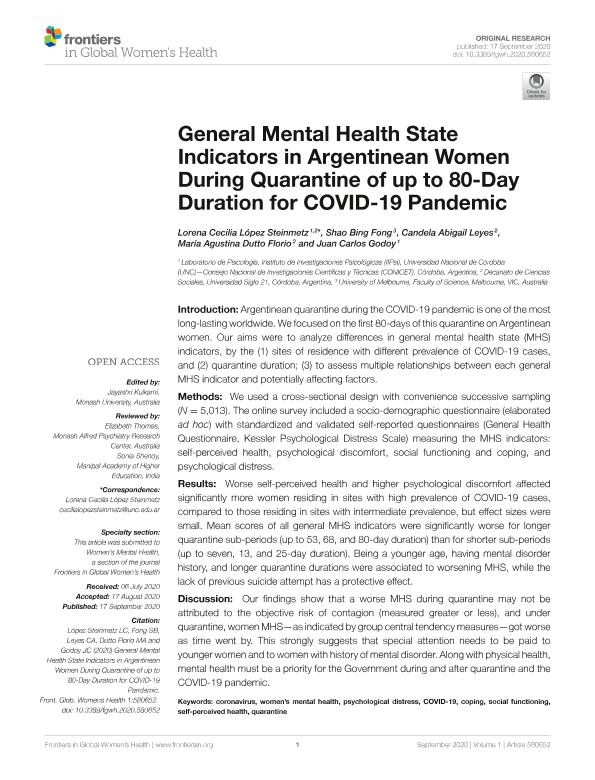Mostrar el registro sencillo del ítem
dc.contributor.author
López Steinmetz, Lorena Cecilia

dc.contributor.author
Fong, Shao Bing
dc.contributor.author
Leyes, Candela Abigail
dc.contributor.author
Dutto Florio, María Agustina
dc.contributor.author
Godoy, Juan Carlos

dc.date.available
2020-09-29T15:44:43Z
dc.date.issued
2020-09
dc.identifier.citation
López Steinmetz, Lorena Cecilia; Fong, Shao Bing; Leyes, Candela Abigail; Dutto Florio, María Agustina; Godoy, Juan Carlos; General mental health state indicators in Argentinean women during quarantine of up to 80-day duration for COVID-19 pandemic; Frontiers Media S.A.; Frontiers in Global Women's Health; 1; 580652; 9-2020; 1-15
dc.identifier.isbn
978-2-88974-262-2
dc.identifier.issn
2673-5059
dc.identifier.uri
http://hdl.handle.net/11336/115076
dc.description.abstract
Introduction: Argentinean quarantine during the COVID-19 pandemic is one of the most long-lasting worldwide. We focused on the first 80-days of this quarantine on Argentinean women. Our aims were to analyze differences in general mental health state (MHS) indicators, by the (1) sites of residence with different prevalence of COVID-19 cases, and (2) quarantine duration; (3) to assess multiple relationships between each general MHS indicator and potentially affecting factors. Methods: We used a cross-sectional design with convenience successive sampling (N = 5,013). The online survey included a socio-demographic questionnaire (elaborated ad hoc) with standardized and validated self-reported questionnaires (General Health Questionnaire, Kessler Psychological Distress Scale) measuring the MHS indicators: self-perceived health, psychological discomfort, social functioning and coping, and psychological distress. Results: Worse self-perceived health and higher psychological discomfort affected significantly more women residing in sites with high prevalence of COVID-19 cases, compared to those residing in sites with intermediate prevalence, but effect sizes were small. Mean scores of all general MHS indicators were significantly worse for longer quarantine sub-periods (up to 53, 68, and 80-day duration) than for shorter sub-periods (up to seven, 13, and 25-day duration). Being a younger age, having mental disorder history, and longer quarantine durations were associated to worsening MHS, while the lack of previous suicide attempt has a protective effect. Discussion: Our findings show that a worse MHS during quarantine may not be attributed to the objective risk of contagion (measured greater or less), and under quarantine, women MHS—as indicated by group central tendency measures—got worse as time went by. This strongly suggests that special attention needs to be paid to younger women and to women with history of mental disorder. Along with physical health, mental health must be a priority for the Government during and after quarantine and the COVID-19 pandemic.
dc.format
application/pdf
dc.language.iso
eng
dc.publisher
Frontiers Media S.A.

dc.rights
info:eu-repo/semantics/openAccess
dc.rights.uri
https://creativecommons.org/licenses/by-nc-sa/2.5/ar/
dc.subject
CORONAVIRUS
dc.subject
COVID-19
dc.subject
QUARANTINE
dc.subject
MENTAL HEALTH
dc.subject
WOMEN'S HEALTH
dc.subject
PSYCHOLOGICAL DISTRESS
dc.subject.classification
Otras Psicología

dc.subject.classification
Psicología

dc.subject.classification
CIENCIAS SOCIALES

dc.subject.classification
Epidemiología

dc.subject.classification
Ciencias de la Salud

dc.subject.classification
CIENCIAS MÉDICAS Y DE LA SALUD

dc.title
General mental health state indicators in Argentinean women during quarantine of up to 80-day duration for COVID-19 pandemic
dc.type
info:eu-repo/semantics/article
dc.type
info:ar-repo/semantics/artículo
dc.type
info:eu-repo/semantics/publishedVersion
dc.date.updated
2020-09-29T15:23:52Z
dc.identifier.eissn
1664-8714
dc.journal.volume
1
dc.journal.number
580652
dc.journal.pagination
1-15
dc.journal.pais
Suiza

dc.journal.ciudad
Lausanne
dc.description.fil
Fil: López Steinmetz, Lorena Cecilia. Universidad Nacional de Córdoba. Instituto de Investigaciones Psicológicas. - Consejo Nacional de Investigaciones Científicas y Técnicas. Centro Científico Tecnológico Conicet - Córdoba. Instituto de Investigaciones Psicológicas; Argentina. Universidad Empresarial Siglo XXI; Argentina
dc.description.fil
Fil: Fong, Shao Bing. University of Melbourne; Australia
dc.description.fil
Fil: Leyes, Candela Abigail. Universidad Empresarial Siglo XXI; Argentina
dc.description.fil
Fil: Dutto Florio, María Agustina. Universidad Empresarial Siglo XXI; Argentina
dc.description.fil
Fil: Godoy, Juan Carlos. Universidad Nacional de Córdoba. Instituto de Investigaciones Psicológicas. - Consejo Nacional de Investigaciones Científicas y Técnicas. Centro Científico Tecnológico Conicet - Córdoba. Instituto de Investigaciones Psicológicas; Argentina
dc.journal.title
Frontiers in Global Women's Health
dc.relation.alternativeid
info:eu-repo/semantics/altIdentifier/url/https://www.frontiersin.org/articles/10.3389/fgwh.2020.580652/full
dc.relation.alternativeid
info:eu-repo/semantics/altIdentifier/doi/https://doi.org/10.3389/fgwh.2020.580652
Archivos asociados
